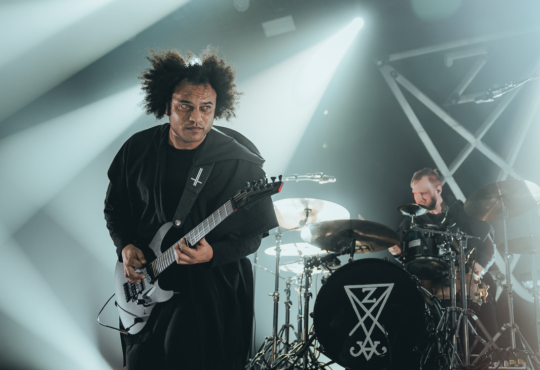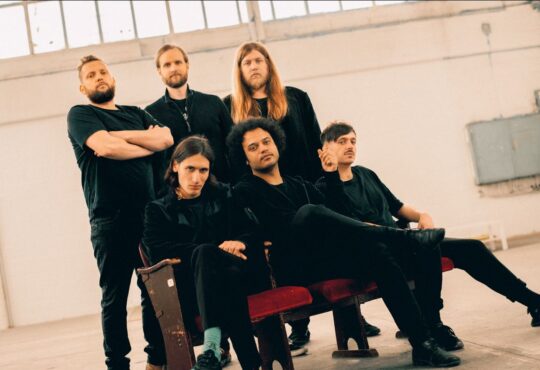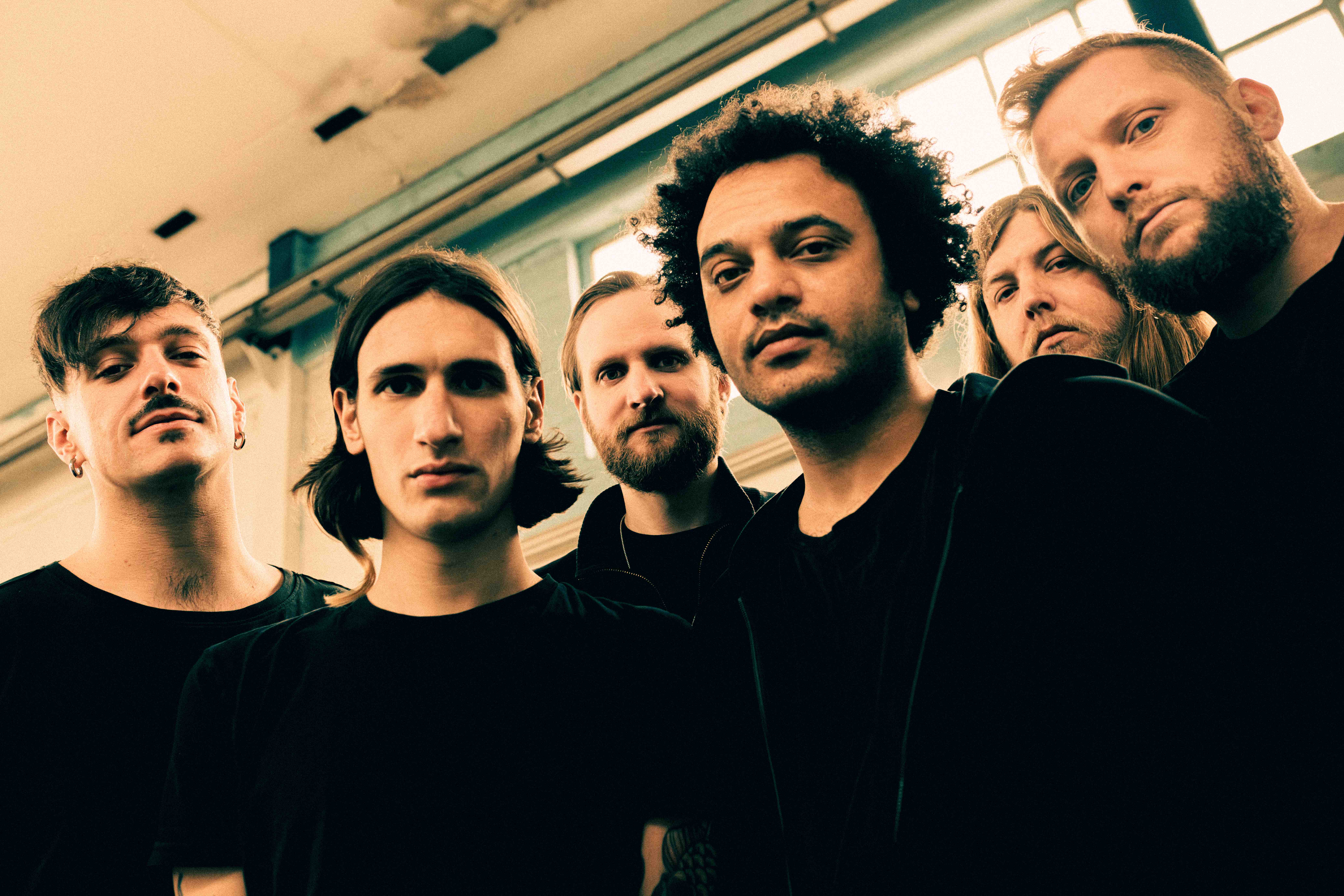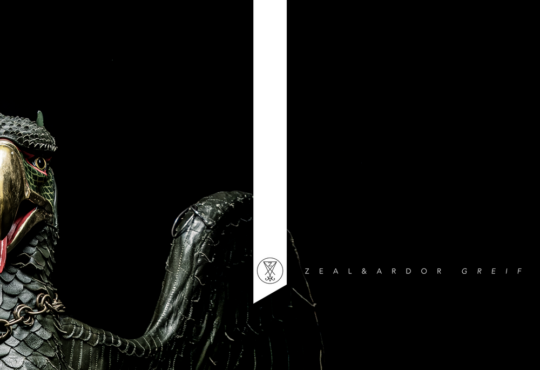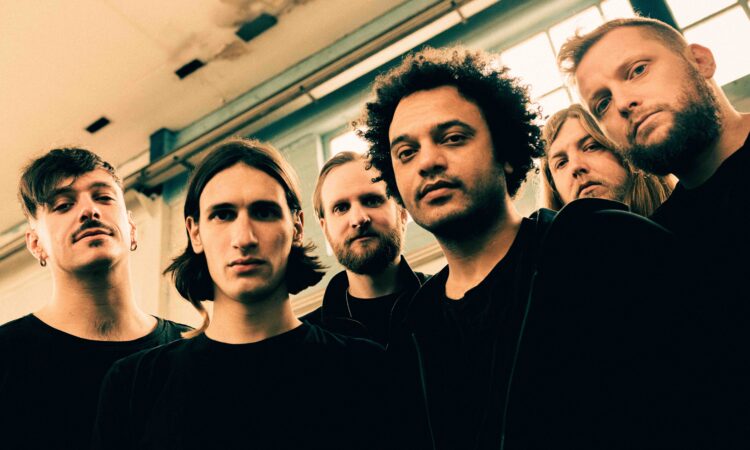
A few months before the release of GREIF, Manuel Gagneux and Tiziano Volante from Zeal & Ardor stopped by Paris to tell us more about this eagerly awaited album.
Hello to the both of you. Thanks for taking the time to talk to us. Our first question is about that actually because it’s usually only you Manuel who appears in interviews and for this new album, GREIF, you are now with him Tiziano. What motivated this change?
Manuel Gagneux (vocals/guitar/writing): Well, because on the album, every musician on stage plays their own instruments. It used to be just me. So it makes sense for everyone to be in the press circuit. We’re kind of in the process of democratizing the band a little bit and to have people be more involved in that.
Tiziano Volante (guitar): I think it was somewhat of a natural progression. I mean, it started out as a one man band or project and even when the band started out, I mean it took this time to actually form a tight knit formation and group and team. And yeah that has been the first time we try it out. Who knows if we keep doing it that way, maybe it sucked for people and we do it otherwise.
Manuel: Yeah. Let’s see. (laughs)
Tiziano: I think it has been more or less a natural progression since it just involves a lot of time in every individual’s life. I mean, maybe at the start, the intention would have been that it was more like a session kind of thing, so people would maybe be easier to exchange. But the history now has shown that we’re a very specific bunch of people with very specific ideas and needs.
Manuel: Absolutely.
Tiziano: And we’re quite dependent on the team we are, I guess.
What do you credit for the evolution from a one-man project to this new record produced as a full band?
Manuel: Necessity. I mean, I never wanted to be alone on stage. So I got them. And then I realized: “Oh fuck, they’re actually really competent and great people, it would make sense to have them be more involved“. It was, yeah, like you said, a natural progression.
And what does it change? In the recording sessions, for example.
Tiziano: It changed in that sense that the translation of the full fledged album to the stage was put in advance of the album production. Like, even up until now, the album was usually done like a complete master, and then we would need to figure out how we would actually perform that on stage. And now that was already a part of the recording process, even though we still thought like: “Let’s do it the studio kind of way instead of just live performances“.
Once you’re in the studio, do you, and the band as a whole, have the opportunity to have your own inputs on the songs?
Tiziano: I mean, the structure was laid down. The general ideas were laid down. It was mostly a part of like how it was interpreted, I would say. Like articulation, sounds, setups, playing on our individual instruments. And I think it just gave the whole thing more depth and maybe a little more detail.
Manuel: He actually already recorded what he had in mind and it was… better. (laughs) So it was quite a bit of change.
Tiziano: Yeah, it was just what the natural progress would have been for me personally. I think it’s the same for Mark [Obrist] on the drums, which is usually the first one to record anything. And the same for Lukas [Kurmann] on bass and our two vocalists as well. It’s just interesting to see that the translation part was part of the recording. Usually that’s somewhat of an afterthought, so that was cool to actually know the songs when we played them.
And before, for the previous albums, you only listened to the songs when you were rehearsing for the live shows?
Tiziano: Yeah. More or less.
Manuel: Pretty much.
Tiziano: It’s also kind of a time management thing. Once this project started rolling out, there was, yeah, timelines to be met and albums to be made.
As it happens, would you like to be even more invested in the project?
Tiziano: Yes and no. Actually… Maybe. Maybe more before this album but now I think I’m quite happy with how the situation is. Maybe when it comes to riffs or so, whatever my strengths are, probably riffs, would be that. But when it comes to the conceptual ideas, the macro vision on things, that’s absolutely a strong point. Yeah, yeah.
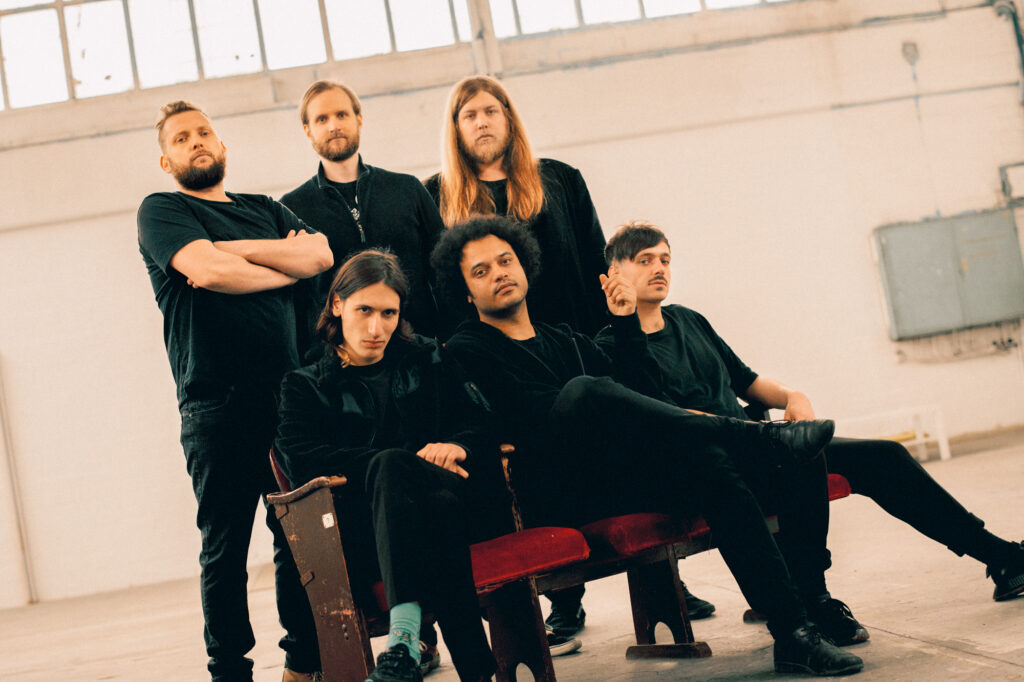
And talking about the conceptual ideas, the themes, the title and the cover of this new album is based on your hometown of Basel [Switzerland] tradition called Vogel Gryff.
Tiziano: Yeah. That’s the best one we heard so far. (laughs)
Oh we’re glad then! (laughs) Can you tell us more about this tradition?
Manuel: So every year, a guy in a big bird costume, basically.
A griffin?
Manuel: A griffin. That sounds better. (laughs) There’s two halves of the city, and it’s separated by a river. One half is more working class and the other one is more bourgeois. And we’re from the cool one, the working class one. (laughs) And it’s like a really old tradition where this bird, griffin, turns its back to the bourgeois side. Yeah, actually it shows them its ass. If you were born in Basel, you would go with your school class to see it and it’s very impactful for anyone who lives there.
And each time everyone in the city goes there?
Manuel: Well, at least once. It’s like a old tradition, but every child has seen it.
Tiziano: Yeah. It’s just something we basically grew up with. It’s that idea of using whatever means you have to sort of rebel against an oppression or oppressor. Yeah, that’s that’s quite a creative, non harmful way to do that.
And so, how does this theme, this tradition, translate in the album?
Tiziano: (Breathes in as he’s about to talk) No. (laughs)
Manuel: We always associated ourselves with rebellion in some way shape or form. Well the intro is basically an ode to that, and also musically it’s kind of leaning towards what happens there. It’s like a framing device for the whole album, yeah.
Tiziano: Also, the mythical creature itself is a combination of different animals, which also is quite representative for what Zeal & Ardor does and stands for. Just bringing different things together and making a new beast out of it.
It is also a very neat cover for the album.
Manuel: Yeah. Thanks. Yeah. Luckily. (laughs) Can you imagine if it was shit?
Tiziano: Funnily enough, the old, old version looks quite silly. It looks kind of (hesitates) I don’t want to say dumb, but kind of goofy. Yeah it’s kind of funny. And the newer versions are a little bit more evil or impactful.
Yeah it looks kind of regal in a way, looking down on you.
Tiziano: Yeah, yeah.
Manuel: Yeah, it’s imposing.
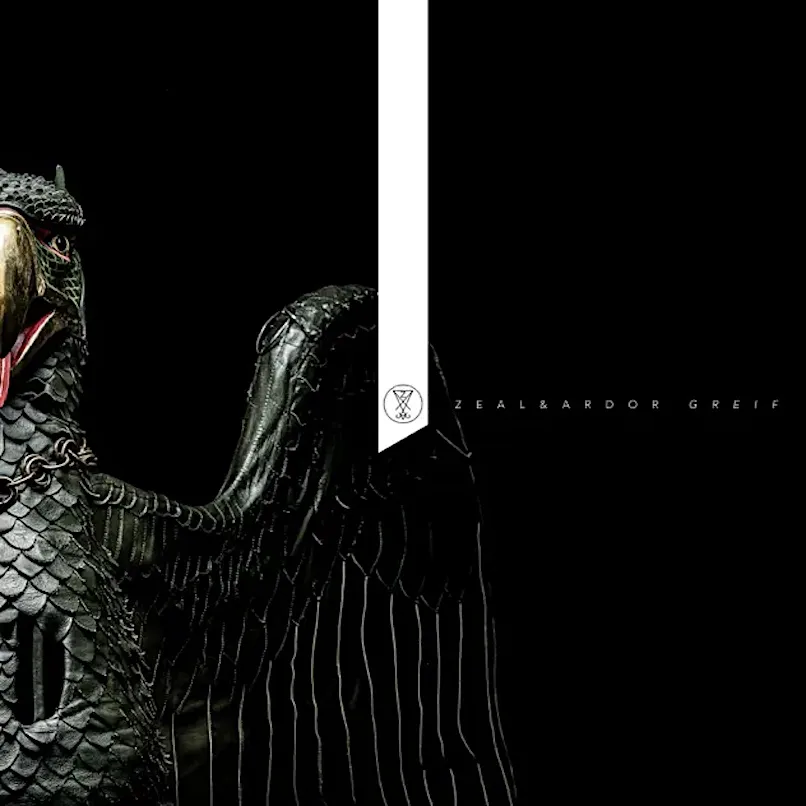
Coming back to the record’s title, it could be mistaken as the word “grief” in English. Did this sort of play of words play a part in the decision-making for the title?
Manuel: Maybe subconsciously. I think first and foremost I just wanted to feature our tradition there. But it does make sense. And in retrospect as like during the development we were like: “Oh wait, it could also be grief“. And yeah, we kind of leaned into that also but I think it was more a lucky coincidence. Well, unlucky, because it’s grief.
Does GREIF talk about grief at some point? Because the lyrics are, not mystical but, everyone has its own interpretation anyway, so we were curious about your input on this aspect.
Manuel: The song “Solace” is pretty much only about grief. But there’s also other stuff so… Wow. (laughs)
You alluded to it earlier but there is a certain political side your band, since the beginning. There was also the EP Wake Of A Nation some years ago. So you’re really politically aware and, besides this opposition between rich and poorer sides, what political themes did you instill in the album?
Manuel: They’re not as apparent. They’re not as “in your face” as the other ones. There’s certain aspects… The aspect of diaspora and, basically, class struggle, I guess would be a central one in this one.
Tiziano: And also our city played somewhat of a role in a current conflict that is quite prominent. So you might want to read into that.
What is it about?
Manuel: That’s the thing. We really like it when people can kind of dig and find out for themselves. And also, I don’t think we want to be associated with that too overtly. (laughs)
Tiziano: Just do your research on your own and you’ll figure it out.
You did an interview with Kerrang! in the past months where you said that even though the whole band participated in the recording, you still wrote everything by yourself. You even called yourself a “control freak” and said that if an album where the whole band had any input on its writing were to fail, you could subconsciously put the failure on the band and that it wouldn’t have happened if you were to write it alone. Does that close the door to including the rest of the band in the writing process in the future?
Manuel: No, I don’t think so. I think I also have to come to terms with the fact that often getting help is a good thing. And yeah, control freak is not a great quality to be. And I’m, you know, I’m also getting better at things in that regard.
Tiziano: I mean, likewise for the rest of the crew. I guess everybody is also a control control freak in their own regards, probably in different fields, in different areas. So I think it’s kind of a process for everybody of learning to trust each other, trusting the process. And by now we’ve been doing it for a couple of times and I think we already put some weird shit out there that may have turned some heads. So far we’ve not been running that badly with it. So yeah we’re going to try it out as far as we can.
Let’s talk about the music for now. Listening to the album, it feels much less aggressive than the one before. Was that a conscious decision or did it came pretty much naturally during the writing?
Manuel: I think it was not a conscious decision. What was conscious is that I wanted to include more colors or styles. Because if you want to listen to exactly that music, we already made that album and I would rather try new things. That doesn’t mean that we have to get softer and softer, but just try a new shit.
Tiziano: Just trying to head into different areas, wherever they may be. So for this album, you could say they’re a little more mellow. But even though I think if you look closer, they are probably not. I mean, that’s for the listeners to really decide. Again, I think it’s just how Manuel produces and collects his ideas and music and we’re all basically here just to make it as good as a life experience as we can.
You just talked about different colors for this album, what kind of main colors does GREIF have?
Manuel: I think it’s like a kaleidoscope now. Because it’s not just one, it’s like a bouquet of flowers or (takes a caricatural somber voice) bouquet of corpses. (laughs) I wouldn’t say it’s one single color. And I think that’s also like the gryff, which is, you know, an amalgam of different animals and that’s why we chose it, because it’s like a buffet.
Tiziano: It’s also really fun to have a little more options and directions of where we can go when conceptualizing a setlist. So there’s just a little more as you said before like brushes and colors to paint with. And for us on stage it’s just cool to have new material to play to people and see how they react to it.
Will the stage renditions of the song change in comparison to the album versions then?
Tiziano: A little bit.
Manuel: A little bit. I wouldn’t say it’s going to be like acoustic versions or anything. (laughs) First of all, there’s the limitations of us being on stage, but there’s also the experience of having played these songs so many times that you figure out: “Oh, what if we did this? That sounds great.” And then we stick with it.
Tiziano: Yeah. That is just a big part of music that gets kind of forgotten these days, especially with social media, which is music is, at the end of the day, not a product. It’s a cultural practice. And also, even if we recorded these things with our best intentions and our expectations to have reached the highest quality with with the options we have, it’s still something that is part of a process of figuring things out. “Oh, let’s do it that way“, because I don’t know, it’s more fun or it has more impact or it’s more easy to play it that way. So yeah, it’s an ongoing process, even with old, old songs, I think.
Do you ever feel the need to revamp those old songs?
Manuel: We never do it, but I think we all at some point felt that we listened to this song enough now, and maybe we should have a new aspect of it.
Tiziano: Yeah. I mean, that’s that’s sometimes a little harsh on the audience side because a lot of people haven’t heard of us, and it’s always nice to reach those. And I think it’s good to give them a more classic overview of what we have. But on the same time, there is people that have seen us. We’ve played some songs like hundreds, a thousands of times. So you need to find a good balance between new material, old material so the people still have like the full experience you could expect from from us in 2024.
Do you think your fans will welcome the album in a good light?
Manuel: We don’t know. I think if I have any expectation I’m going to be disappointed or wrong in both directions. I’m just curious to how they will react to it. We’ll see.
What makes you the most curious?
Tiziano: Actually, nothing in particular. Just the whole album as a whole. On one hand I’m anxious about people that are very drawn to a specific image they have with us. But on the other hand, I have a lot of trust in our audience that they’ll get it. Also, I think a lot of people know what Manuel does apart from Zeal & Ardor [ed. Birdmask, a pop chamber project]. And I think for them it’s not that big of a change or surprise. I think it’s a very natural progression.
The song “to my ilk” was chosen as the first single and. It’s probably the softest song you ever wrote. What does it represent to you? Especially with its place as the album closer?
Manuel: I think it’s in many ways about us as a group. I think it’s… I don’t know, an ode to us. But of course, the lyrics are very specific and I think that’s for everyone who listens to decide. But in many ways, for me, it means that we’re played in the radio. (laughs)
What was the motivation to release it as the first single?
Manuel: Actually, what we wanted to do is just have a biggest contrast. We like surprising people. So, first we put out that and like: “Oh, fuck, it’s going to be only acoustic slow songs“. And then the second single was “Clawing Out”, which in many ways is the heaviest song we’ve written so far. And it’s just like, give them something nice and then you slap them. (laughs)
Tiziano: And then with everything else in between.
Since we were talking of colors, and so on, the track “une ville vide” is really striking amidst the whole album. It’s fully instrumental, has loads of arpeggios and synths and, to be honest, is really beautiful. It appears as an interlude of sorts but seems to mean more than just an interlude, which would be those shorter instrumental track between “real” songs, which don’t necessarily have the time to evolve.
Manuel: Yeah. I mean, it’s not just one emotion, you know, it’s like a micro journey. Because that piece was actually written earlier and it was actually way longer. And so I kind of have to cut the track, but I think it works really well.
Tiziano: For me, it’s one of my favorite interlude-ish kind of songs [Manuel] did so far. I mean, instrumentation wise, you did similar things but I think it’s just the lining of the melodies, which is fucking beautiful.
Manuel: Cool. That’s cool.
You just talked about shortening that track which was longer in its earlier stage and on the album, well, most of the tracks are under three minutes of runtime. There seem to be a wish to condense really the music, the ideas into the most immediate forms.
Manuel: Yeah. I’m not a huge fan of repeating too much. And you know, there’s not one guitar solo really on the album.
Tiziano: There is one. And I love it. It’s absolutely dumb and it’s perfect that way. (laughs)
Manuel: But yeah, it’s like, we have the idea here. Okay, one more repetition and then it’s fine. You had it.
You don’t feel to urge to make the song the last eight minutes or so.
Manuel: You know, there’s bands who do that and it’s great. But I think that’s honestly not what I’m great at and I shouldn’t fake it.
Tiziano: I mean, on this album, there may be not that long songs. We do have some songs that are at five minutes.
Manuel: Yeah, but not like prog rock which are like eight minutes and then there’s this saxophone or something else.
Tiziano: I mean, I don’t know, I don’t want to speak completely for you, but I think us as a band or musicians we’re all really interested in good songs. At least in my ears. And that may be coming down to ADHD as well. I love hooks and earworms and I never get them out of my head. And I love those songs that just catch me that that way. And usually it’s the ones that are a little more poignant and concrete. So that way you just repeat the song again instead of having ten minutes that’s actually just like… I don’t know. And then you go… yeah, I don’t know. (laughs) It’s also a great experience. There are bands that absolutely mastered that kind of discipline. I don’t think that’s our field.
Manuel: No, no. Not yet. (laughs)
What do you think is more part of Zeal & Ardor’s identity ? The metal side or the gospel one?
Manuel: I think both are there, but I wouldn’t say that there’s any dominant thing. Of course, metal is present in most. But then again, so it’s the soul aspect of it. But, um, yeah, I’m very indecisive and I love being indecisive.
Because the album, while still a bit heavy at times, seems to have more soul components than metal components.
Manuel: Yeah, that wasn’t a conscious decision. I think that’s just how it happened. And maybe next album will just be grindcore. (laughs)
Tiziano: I think it’s generally more about the attitude towards music and making creative work in general.
Could you expand on that?
Tiziano: Just having fun with it and trying things out and not not trying to put yourself in a corner. Even though we’re known for being the weird kids in school, I guess. Also that can be limiting to some degree because people expect that. And I guess we try to come up with something new to surprise ourselves and listeners.
You said in some other interview that you wished Zeal & Ardor to be known as “the band that experiments“. What are the sonic landscapes you’d like to explore next?
Manuel: There’s so many.
Tiziano: Brazil Funk ! (laughs)
Manuel: Tiziano is a huge fan of horn sections, like trumpets and stuff like that.
Tiziano: That and house pad keys. Yeah. That’s cool.
Manuel: David Guetta. That’s going to be great. A great feature.
So next for Zeal & Ardor is house music?
Manuel: Yeah, we’re gonna go to Ed Bangers Records later. (laughs)
How excited are you to join Heilung during their tour this fall?
Manuel: It’s great. I mean, we’ve played with them before. Obviously, we get to play bigger shows and play to new audiences, and I think it’s going to be like a very… Because Heilung are very spiritual and it’s like a ritual that they do. And then sometimes in many ways, we have a ritual also, and it’s going to be cool to glue those together. And maybe I’m going to wear the hat. Is it a hat? No. Horns?
Is a headline tour on the table for next year?
Manuel: We’re very much set on it, yeah. But of course, it’s always…
Tiziano: It’s not confirmed.
Manuel: Yeah, it’s something that would be shady to say: “Yeah, of course!” And then it’s not going to happen.
Tiziano: We’re trying our best.
Does it get tiring to tour at some point? Having many dates in a small amount of time, etc.?
Manuel: It’s exhausting but I wouldn’t say tiring, but I love what we do. I also love to be at home and play video games but I think if there’s nothing that I would rather do, actually, so…
Tiziano: I think it just takes some awareness on how life on tour works. Like in my head, it’s basically like some sort of SWAT team mixed with a with a pirate vibe.
Manuel: And a dysfunctional family. (laughs)
Tiziano: All crammed into a clown car. And over the years, it has been just a process of finding out how we stay happy, healthy, well nourished, relaxed as much as we can in these conditions where everything is basically contradicting those goals. (laughs) So yeah, I think we kind of figured out how we do things more relaxed and are still learning how to do it more relaxed now with a bigger production, which we are running. It’s the first time it felt like: “Okay, there’s a lot of more work we need to do as a as a crew“, but I feel like it’s actually going to be less work and we are able to delegate more and are better organized in general.
So it’s going to be an impressive show.
Tiziano: There’s a lot of lights. A lot of noise.
Manuel: So all you want ! What else you need? (laughs)
It’s time for us to part ways but before that, a last question. We are RockUrLife so what rocks your life?
Tiziano: Oh, my partner.
Manuel: Yeah?
Tiziano: Yeah.
Manuel: Kick ass. That’s nice. Right now what rocks my life is watermelon and feta salad.
Tiziano: Oh, yes.
Manuel: It’s amazing.
Yeah, really?
Manuel: Yeah. It sounds weird, I think this is what I’m going to eat for the next three months. (laughs)
Tiziano: And then never again! (laughs)
Manuel: What rocks your life?
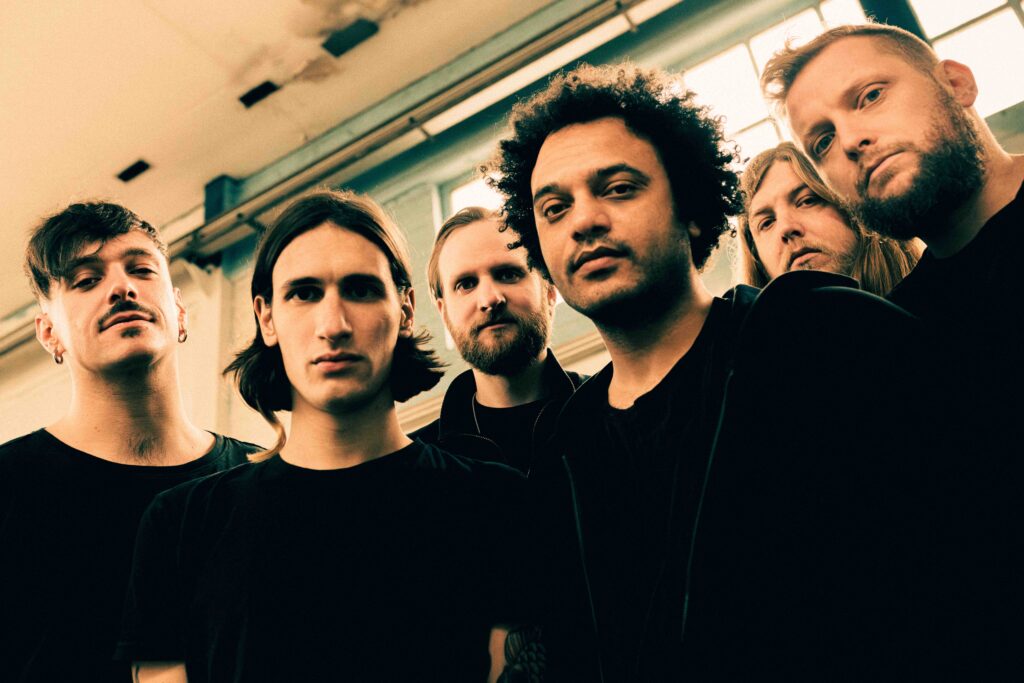
Website: zealandardor.com



